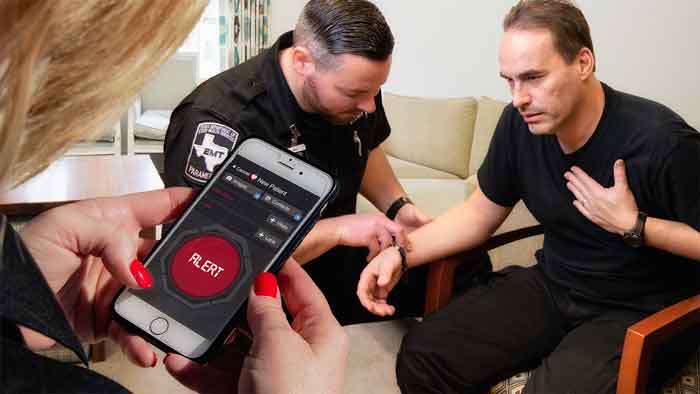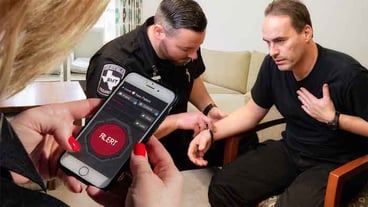Pulsara Around the World - February 2026
January Recap The start of 2026 was on the slow side for our events schedule, with our team heading to the Florida Fire & EMS Conference, the...

Healthcare systems must continue to adopt mobile-friendly platforms to meet users' expectations and offer high-quality care.
Many industries have overhauled their businesses to meet consumers’ expectations of using their mobile devices to do everything from checking in for a flight to ordering takeout food. The healthcare industry has been slower to adopt mobile-friendly platforms, but it is increasingly doing so to meet patients’ and health professionals’ needs. But simply taking current methods of communication and putting them on smartphones is not sufficient — platforms must capitalize on the many advantages mobile technology offers in order to truly transform and improve healthcare.
With smartphone ownership among American adults rising every year, people increasingly expect to conduct all aspects of their lives on their phones. Companies like Amazon, Delta, Starbucks, Domino’s and virtually all news organizations—the list is endless—now deliver their customer services and products using mobile apps and mobile adaptive websites. These companies recognize that the future of their businesses depends on meeting needs of mobile-based consumers.
Traditionally, healthcare has not operated as a consumer-driven industry. On the whole, healthcare providers have been slower to adapt to mobile, consumer-centric platforms when compared to many other industries.
In many healthcare organizations, communication and information technology systems have been created using a number of different platforms that are not necessarily interoperable or mobile adaptable. System updates can be hampered by requirements to ensure HIPAA-compliance as well as the privacy and security of healthcare information.
 The healthcare industry is increasingly moving toward mobile-based or mobile-friendly communication systems to replace the phone and fax. Medical professionals as well as patients will reap the benefits of this technology upgrade.
The healthcare industry is increasingly moving toward mobile-based or mobile-friendly communication systems to replace the phone and fax. Medical professionals as well as patients will reap the benefits of this technology upgrade.
Some of the advantages of these mobile systems include:
Platform Continuity
Smart mobile systems allow people to use only their phones to take any necessary action, from receiving alerts or reminders to communicating with colleagues to looking up patient records.
Unified Communication
Instead of different members of a care team using different methods of communication, mobile systems allow everyone to communicate with each other at the same time—ensuring all members of the care team are on the same page.
Data Streaming
Mobile-friendly data systems allow users to stream large amounts of data from the cloud and update data in real-time.
Digital Information
Paper-based call sheets and other notes on critical patient information are still common in healthcare. With mobile systems, all information can be digitally exchanged, which makes it easily transferrable, shareable, searchable, and savable.
Location Tracking
All mobiles devices are equipped with location-based tracking, which allows for better team coordination and notification—for example, by letting the team know the ETA of a specialist on-call.
Automatic Alerts
Automatic mobile alerts can help healthcare professionals stay on top of patient needs by immediately notifying them of everything from new test results to changes in patient vitals to incoming emergent cases.
Instant Feedback
Mobile-based systems allow for instant feedback. Immediate feedback rather than delayed response can speed patient care in many arenas such as specialist consults, patient follow-up, referrals, and medication orders. Providing feedback to other members of the continuum, such as emergency department staff and EMS personnel, can improve relationships by helping them feel like part of an integrated team.
Emergency medical services is one area of healthcare where mobile-based systems could make a big difference in patient care. Often in EMS responses, time is critical. Rapid communication, data exchange, and alerts between healthcare teams can lead to faster patient care. In cases of heart attack, stroke, or trauma, faster care saves lives. Mobile platforms also ensure every member of a care team—from the ambulance to the emergency department, the pharmacy to the cath lab—is receiving the same information at the same time, making communication not only faster, but better.
With 80 percent of American adults now using a smartphone, most of us are familiar with the advantages and convenience of using mobile phones. As consumers, we have come to expect that we can conduct many aspects of our lives from the screen of our phone. Increasingly, the healthcare industry is moving to embrace the shift towards mobile to provide greater conveniences for patients and better communication systems for healthcare professionals. It’s about time.

January Recap The start of 2026 was on the slow side for our events schedule, with our team heading to the Florida Fire & EMS Conference, the...

Recent research shows how Pulsara was successfully leveraged to connect more than 6,000 COVID-19 patients to monoclonal antibody infusion centers via...

At Pulsara, it's our privilege to help serve the people who serve people, and we're always excited to see what they're up to. From large-scale...